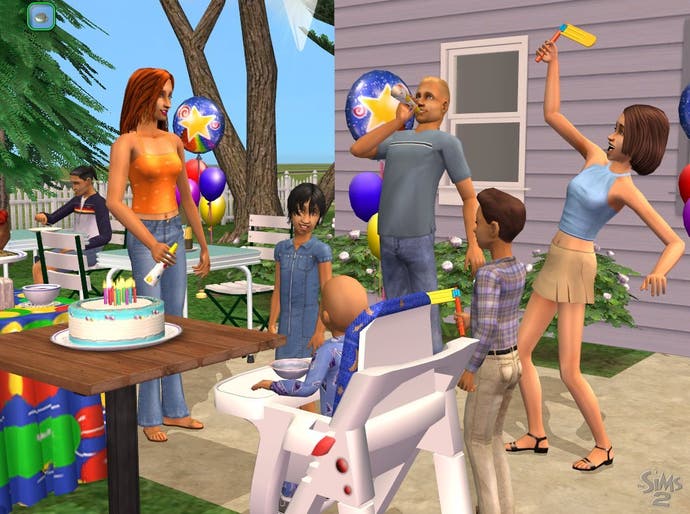The History of The Sims
Tiny happy people.
The Sims is 10 years old this week! To celebrate, we're dusting off our long look back at the series from the start of 2008, prior to the release of The Sims 3. For the full picture, make sure to check out our more recent reviews of The Sims 3 and The Sims 3: World Adventures. What's "happy birthday" in simlish?
Whenever talk turns to the games that have truly broken out of the games ghetto and impacted the world outside, many within our introspective hobbyist sphere seem curiously reluctant to give The Sims its due. The attention instead shifts towards the likes of Halo, and their impressive but carefully presented statistical first-weekend sales victories. Inevitably, this bias is because games like Halo are about dudes in cool armour totally shooting aliens to death, while The Sims is about relationships and choosing furniture and is for stupid gurlz and therefore not a proper game. As much as we moan how society doesn't take games seriously, there's still that counter-productive tendency to cling to the stuff that makes it hard to take seriously, at the expense of games that are innovative, challenging but also undeniably light on shooting aliens to death.
The Sims pretty much epitomises this argument, what with being the best-selling PC series ever, having shifted more copies worldwide than most gurning shooter franchises could ever dream of. Consider this: the original Sims sold over fifty million copies during its lifespan. You can slap at least another twenty million on that figure once you throw in the expansion packs. The Sims 2 and its add-ons sailed over the hundred million sales threshold in three years. While its domesticated structure may leave many boy gamers confused and angry and oh-so-insecure, The Sims is inarguably one of the most important and successful games franchises of the 21st century. And now The Sims 3 is bearing down on us, like an impeccably-dressed steamroller with a green diamond floating on top, so let's see how it all began.

And the answer is...FIRE! Yes, fire. Primeval elemental force! Cornerstone of man's social evolution! Promethean metaphor for the follies of hubris! And, according to popular myth, the catalyst for Sim City creator Will Wright to invent the first people simulator. The story goes that having seen his house burned down in the 1991 by fires which swept Oakland, California, Wright allegedly realised that the process of rebuilding and furnishing his home had gameplay potential. While this yarn serves the brilliant nerd stereotype almost too neatly, the truth is actually much more prosaic. The Sims was just a natural extension of ideas Wright had been playing with since the first Sim City game in 1989. Having incorporated social behavioural models into Sim Ant, and created rudimentary Sims to populate the streets for the otherwise forgettable 1996 effort Sim Copter, crafting a game based around the actions of simulated virtual people was a logical next step.
But while the concept seemed obvious to Wright, it didn't exactly catch the imagination of his fellow Maxis developers, corporate overlords Electronic Arts or even the general public. As Wright admitted in an interview with the strutting peacock of games journalism we know as Kieron Gillen, the core concept was roundly rubbished at focus groups as far back as 1993. "It was a battle, the first few years, inside Maxis," quoth the game design guru. "It was referred to as the toilet game. It was the game where you clean the toilet." With the interactive doll house idea firmly rejected, Wright got sneaky and worked in secret with just one programmer to create the basic engine that would drive the complex environmental interactions The Sims would need in order to make sense. With a working prototype to back up Wright's conviction The Sims was given the go-ahead - though expectations remained low. Wright himself admits that selling just one million copies was his dream scenario, though he was braced for the possibility of an embarrassing flop. Electronic Arts was even less convinced, allegedly estimating sales of less than 200,000.

The Sims finally debuted in February 2000, almost a full decade after the idea first percolated in Will Wright's imagination, and was greeted with almost universal acclaim and boardroom cries of, "Oh, so that's what you meant Mr Wright, we now agree it's a super idea, please make lots more of these." Among the 9/10s being slung in the games direction was one from this mighty oak of a website, then a mere stripling in the Internet forest. "The Sims really does grow on you, and with you," boomed the Eurogamer of eight years ago, its words echoing throughout history. "It's original, compelling, and best of all enjoyable."
As players sank hours into their virtual neighbourhoods, they inevitably exhausted the game's built-in toolset and began to crave additional content. Luckily, Will Wright had predicted this hungry need, and had actually held the game back an extra year in development to ensure that the code chassis would be able to accommodate player modifications and official content expansions. While some free objects were made available from the Sims website, the bulk of the game's evolution took place in commercial expansions. Seven such themed releases popped onto the shelves between 2000 and 2003, usually introducing or reinventing some element of Sims life along with a slew of related objects, items and costumes.






.jpg?width=291&height=164&fit=crop&quality=80&format=jpg&auto=webp)
_Rwmp6uD.jpg?width=291&height=164&fit=crop&quality=80&format=jpg&auto=webp)

